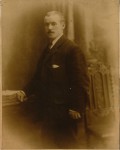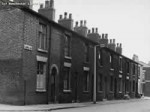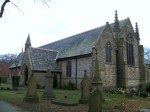 From time to time I will be writing the occasional blog post about people in my own family tree, and today it’s the turn of my maternal grandfather, Francis Manley. I have always been fascinated by the fact that my grandfather was born in 1865, when Victoria was not half way through her reign, and when Dickens was still alive. He had my mother late in life from a second marriage and so was already at retirement age when she was born. I love the fact that I have a Victorian grandfather – it makes me feel more in touch with that period. Of course the downside of that is that I never knew him. He died when my mother was 11 years old at the age of 70.
From time to time I will be writing the occasional blog post about people in my own family tree, and today it’s the turn of my maternal grandfather, Francis Manley. I have always been fascinated by the fact that my grandfather was born in 1865, when Victoria was not half way through her reign, and when Dickens was still alive. He had my mother late in life from a second marriage and so was already at retirement age when she was born. I love the fact that I have a Victorian grandfather – it makes me feel more in touch with that period. Of course the downside of that is that I never knew him. He died when my mother was 11 years old at the age of 70.
For many years I had been unable to find his birth details. Searches of the GRO indexes had drawn a blank, and I had not been able to find him on the census before 1891. Then one day, I was discussing him with my mother, and she said that she had thought he had been fostered at one point. I asked my aunt, and she said that the name McKewen might have been the names of the foster parents.
I tried searching the 1881 census for Francis MCEWEN – and bingo – there he was! But the information I found was a little different to what I had expected. The 15 year old Francis McEwen and a younger sister were living in the household of John MANLEY and his wife Margaret Ann. The relationship to the Head of Household was brother. What did this mean?
Searches of the 1871 census again proved difficult, and I tried searching for both MANLEY and MCEWEN names. In the end, by taking out the first name and just searching for all 5 year olds named MCEWEN, I found him – his first name had been written as “Fracis”, which is why I had not been able to find him at first.
The amazing thing was that he appeared to be the youngest son of a John MCEWEN and wife Margaret Jane. This was a revalation – he had not been born a Manley and fostered by McEwens; it was completely the other way around! Further searches revealed that his parents both died in 1873, and Francis and his younger sister had obviously been brought up for the rest of their childhoods by his older sister, Margaret Ann, and her husband John MANLEY.
My mother and my aunt were very surprised to learn that their family name was not Manley, but McEwen – and that the family had arrived in Liverpool from Ireland a couple of generations before my grandfather!
So, to begin at the beginning, my grandfather’s story is as follows:
 He was born in Clifford Street, Openshaw, Manchester, on 31st May 1865, the son of John McEwen, a labourer in the iron works, and Jane Stickney (the granddaughter of an American ship-wright and mariner – but that’s another story…). On looking at old maps, I can see that there were several iron foundries and iron works in this area, as well as railway works. They were still living in the same street in 1871, and two of Francis’s older brothers worked on the railways. This street no longer exists but I imagine they were similar to the terraced houses shown on the left.
He was born in Clifford Street, Openshaw, Manchester, on 31st May 1865, the son of John McEwen, a labourer in the iron works, and Jane Stickney (the granddaughter of an American ship-wright and mariner – but that’s another story…). On looking at old maps, I can see that there were several iron foundries and iron works in this area, as well as railway works. They were still living in the same street in 1871, and two of Francis’s older brothers worked on the railways. This street no longer exists but I imagine they were similar to the terraced houses shown on the left.
By 1881, Francis’s parents had died, and he and his younger sister were living with their married sister Margaret Ann Manley in Openshaw. John Manley also worked with iron as a forgeman. The 15 year old Francis was a “cart boy”. It seems very likely that he was in charge of a cart used to transport goods for the railway. Thus he started his long and successful career with the Manchester Railways.
Seven years later he was marrying his first wife, Annie Lawton, in the parish church of Cheetham, and he was living in Salford at the time of the marriage – the other side of Manchester from where he had been born. What is interesting about the marriage certificate is that he gives his name as Francis Manley – and also names his father as John Manley. Francis gives his own occupation as “Clerk”. Already he had got himself a desk job!
I have often wondered why he names John Manley as his father. His parents had not died so early that he would have forgotten them, but perhaps John was a better father figure than his real father had been. Another strange anomaly is that in every census from 1891 he gives his place of birth as Hanley in Staffordshire (which had earlier led me to a couple of wasted hours at Staffordshire Record Office!). This is actually the same place of birth of his step-father/brother-in-law, John. Did he want to disassociate himself from his real origins, or did he really think he had been born there?
Francis and Annie settled down in Cheetham were Francis was now established as a railway clerk, while Annie took in work as a draper and dressmaker. Cheetham was another industrial area – and while I cannot find Garnett Street on a modern map, I imagine they would have been living quite close to Manchester’s Victoria Station – or perhaps Francis worked at the Manchester Exchange Railway Station which had been opened in 1884. Or could he have had something to do with the Cheetham Hill Junction? I have not been able to find him in any digitalised sources – but I may be able to find him at railway archives held locally or at the National Archives.
In 1901 they had moved to Herbert Street. This street still exists, and nearby is a railway depot – but I don’t think this was there when my grandfather was alive. If anyone can give me information on this, I would be very grateful. Francis’s occupation is now “Railway Goods Clerk” and his wife is a dressmaker employing workers at home. They have three children and one servant. While still within the smoke of industrial Manchester, this was a better lifestyle than the one Francis had been born into, where his birth parents and his step-parents had had to manage with many children and no servants in probably very cramped conditions.
Why, I wonder, does Francis suddenly decide to give his birth surname in the 1911 census? He is there in Brandram Road, Prestwich as Francis McEwen, with wife Annie, three children and four boarders – no doubt an extra little money earner, and they are now living close to the open space of Heaton Park. His occupation is “Railway Clerk Shipping Dept”, and his son James (my mother always knew him as “Uncle Jim” though he was actually her much older half brother) is a warehouseman. His two daughters, Annie May and Olive presumably both work for their mother as a mantle maker and pin winder.
 Annie died in 1917 and Francis continued to live at the same house in Brandram Road where he still lived at the time of his marriage to Elizabeth Reid, my grandmother, in 1923. Elizabeth was nearly 30 years his junior and worked as a warehouse employee – perhaps in the same warehouse where Francis’s son worked. His married daughter Olive was a witness to the marriage with her husband. Again, Francis states John Manley to be his father. St Margaret’s Church is shown on the right.
Annie died in 1917 and Francis continued to live at the same house in Brandram Road where he still lived at the time of his marriage to Elizabeth Reid, my grandmother, in 1923. Elizabeth was nearly 30 years his junior and worked as a warehouse employee – perhaps in the same warehouse where Francis’s son worked. His married daughter Olive was a witness to the marriage with her husband. Again, Francis states John Manley to be his father. St Margaret’s Church is shown on the right.
A year later my mother Joyce was born, and two years later my Aunt Dorothy. Very soon after this Francis and his new family retired to the Isle of Man, and my mother had the pleasure of spending her childhood across the road from the sea at Ramsey. What a change it must have been for Francis after the bustle and polluted air of Manchester to settle down surrounded by the beautiful Manx countryside and coastline, with the sound of the sea constantly in his ears.
He was to enjoy several years of this new life before he died of a stroke in 1935. My mother always speaks of him very fondly – as a proud but happy and generous man. I guess he had reasons to be proud. He had worked hard all his life and provided both his families with a more comfortable way of life than the one he had started with.
He is part of the history of Manchester and the large part it had to play in the development of the railways. He would no doubt have seen them building the grand and glorious Manchester Town Hall which opened in 1877. He was literate, loved Charles Dickens and was, I believe, open-minded and intelligent. He encouraged my mother when she showed a talent as an artist, which very few fathers would have done back then.
There is more research to be done to find out more about my grandfather’s life, and some questions may never be answered, but this is the story I have so far pieced together from BMD, the census and the oral history from my mother and aunt. It is amazing how much one can put together from relatively few documents!


What a beautifully written piece and fascinating. Thankyou.